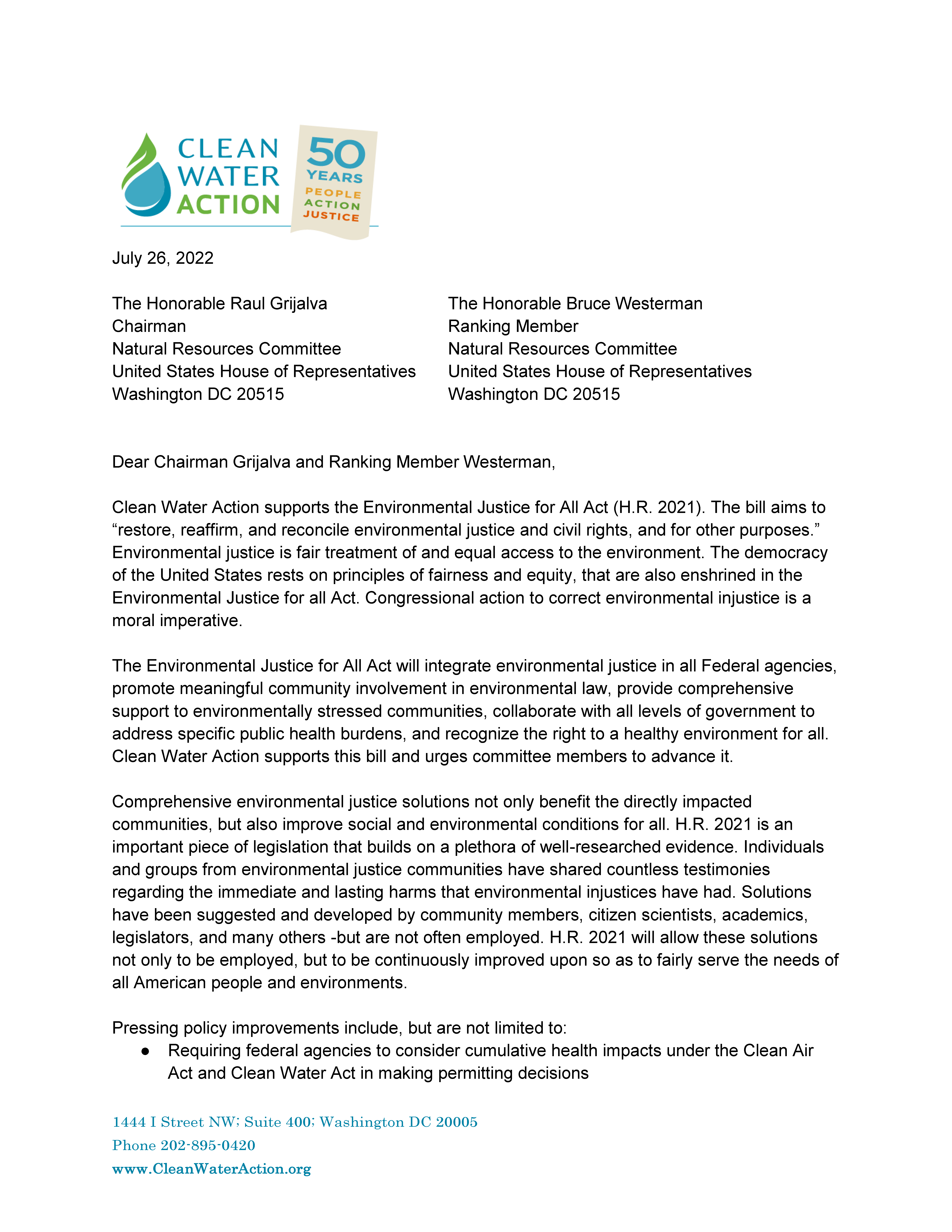The Environmental Justice for All Act (H.R. 2021), introduced by Representative Raul Grijalva (D-AZ) and Representative Donald McEachin, (D-VA) is a long overdue package of reforms that will help address the history of environmental injustice that has led to undue burdens of pollution on people of color and low-income communities. Clean Water Action has submitted the following letter to the U.S. House Natural Resources Committee in support of this legislation.
July 26, 2022
The Honorable Raul Grijalva
Chairman
Natural Resources Committee
United States House of Representatives
Washington DC 20515
The Honorable Bruce Westerman
Ranking Member
Natural Resources Committee
United States House of Representatives
Washington DC 20515
Dear Chairman Grijalva and Ranking Member Westerman,
Clean Water Action supports the Environmental Justice for All Act (H.R. 2021). The bill aims to “restore, reaffirm, and reconcile environmental justice and civil rights, and for other purposes.” Environmental justice is fair treatment of and equal access to the environment. The democracy of the United States rests on principles of fairness and equity, that are also enshrined in the Environmental Justice for all Act. Congressional action to correct environmental injustice is a moral imperative.
The Environmental Justice for All Act will integrate environmental justice in all Federal agencies, promote meaningful community involvement in environmental law, provide comprehensive support to environmentally stressed communities, collaborate with all levels of government to address specific public health burdens, and recognize the right to a healthy environment for all. Clean Water Action supports this bill and urges committee members to advance it.
Comprehensive environmental justice solutions not only benefit the directly impacted communities, but also improve social and environmental conditions for all. H.R. 2021 is an important piece of legislation that builds on a plethora of well-researched evidence. Individuals and groups from environmental justice communities have shared countless testimonies regarding the immediate and lasting harms that environmental injustices have had. Solutions have been suggested and developed by community members, citizen scientists, academics, legislators, and many others -but are not often employed. H.R. 2021 will allow these solutions not only to be employed, but to be continuously improved upon so as to fairly serve the needs of all American people and environments.
Pressing policy improvements include, but are not limited to:
- Requiring federal agencies to consider cumulative health impacts under the Clean Air Act and Clean Water Act in making permitting decisions
- Codifying and bolstering President Clinton’s 1994 Executive Order (E.O. 12898) by directing federal agencies to develop environmental justice strategies and regularly report on implementation and progress. It also ensures that federal agencies include and consider diverse communities in public health research, data collection, and analysis
- Strengthening the National Environmental Policy Act (NEPA) to ensure that communities have a meaningful opportunity to engage in NEPA processes that will impact them
- Providing $75MM in annual grants for research and program development to reduce health disparities; and improve public health in environmental justice communities
- Strengthening the Civil Rights Act to permit private citizens and organizations facing discrimination to seek legal remedies, consistent with overturn of the Supreme Court decision in Alexander v. Sandoval
- Creating a just energy transition economic development assistance fund -paid for through new fees on oil, gas and coal companies- to support communities and workers as they transition away from greenhouse gas-dependent economies
Thank you for taking leadership on the Environmental Justice for All Act and for holding the July 27 hearing. We urge you to ensure that this critical legislation to address historic inequities and reconcile environmental justice and civil rights moves forward.
Respectfully,
Thea Louis, National Water Projects Coordinator
Kim Gaddy, National Environmental Justice Director

